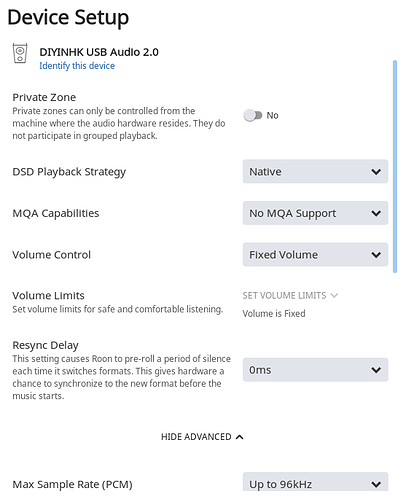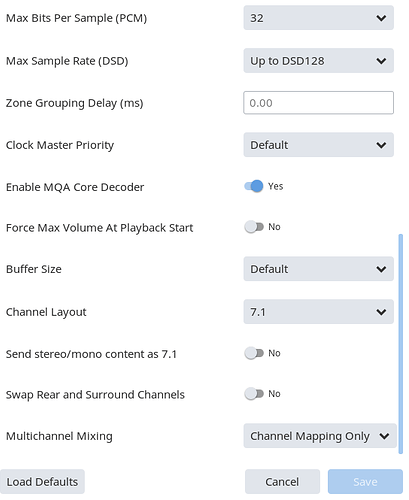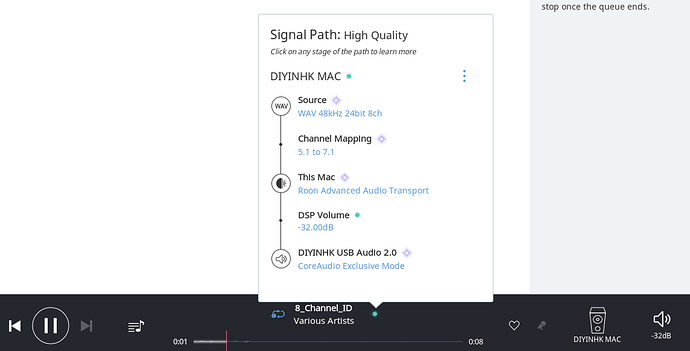I’m not able to have my multichannel DIYINHK USB DAC working on any Linux Roon endpoint I have tested. Stereo playback works but sending any multichannel signal (3 to 8 channels) leads to an error “Transport: Failed to initialize the audio device”
I get this on any Linux machine I’ve plugged the DAC into:
- Raspberry Pi under DietPI/RoonBridge, Volumio/Roonbridge
- Allo Sparky under Dietpi/RoonBridge
- even my Roon Server, Intel NUC running Roon OS/Roon Server
My test files are 6 channel or 8 channel .WAV files. The same test files play perfectly using my MacBook Air as a Roon endpoint (DAC is UAC2 compliant and therefore driverless on Mac OS and Linux).
I am also able to play the multichannel test files in Linux directly which makes me think the issue might be with Roon Bridge on Linux wrongly handling multichannel over USB:
root@DietPi_Pi:/usr/share/alsa# aplay -Dsurround71:D20 /6c16.wav
Playing WAVE ‘/6c16.wav’ : Signed 16 bit Little Endian, Rate 44100 Hz, Channels 6
… all 6 channels playing well!
NB in case it’s relevant: the DAC only accepts 16bit or 32bit format, no 24bit
Below are some configuration information, outcome of aplay -L as well as device configuration in Roon.
Thanks @support for your help, I really need to have multichannel RAAT streaming working on the Pi or Sparky to finish my DIY WIFI 8channel streamer and DAC.
> root@DietPi_Pi:/usr/share/alsa# aplay -L
> null
> Discard all samples (playback) or generate zero samples (capture)
> sysdefault:CARD=ALSA
> bcm2835 ALSA, bcm2835 ALSA
> Default Audio Device
> dmix:CARD=ALSA,DEV=0
> bcm2835 ALSA, bcm2835 ALSA
> Direct sample mixing device
> dmix:CARD=ALSA,DEV=1
> bcm2835 ALSA, bcm2835 IEC958/HDMI
> Direct sample mixing device
> dsnoop:CARD=ALSA,DEV=0
> bcm2835 ALSA, bcm2835 ALSA
> Direct sample snooping device
> dsnoop:CARD=ALSA,DEV=1
> bcm2835 ALSA, bcm2835 IEC958/HDMI
> Direct sample snooping device
> hw:CARD=ALSA,DEV=0
> bcm2835 ALSA, bcm2835 ALSA
> Direct hardware device without any conversions
> hw:CARD=ALSA,DEV=1
> bcm2835 ALSA, bcm2835 IEC958/HDMI
> Direct hardware device without any conversions
> plughw:CARD=ALSA,DEV=0
> bcm2835 ALSA, bcm2835 ALSA
> Hardware device with all software conversions
> plughw:CARD=ALSA,DEV=1
> bcm2835 ALSA, bcm2835 IEC958/HDMI
> Hardware device with all software conversions
> sysdefault:CARD=D20
> DIYINHK USB Audio 2.0, USB Audio
> Default Audio Device
> front:CARD=D20,DEV=0
> DIYINHK USB Audio 2.0, USB Audio
> Front speakers
> surround21:CARD=D20,DEV=0
> DIYINHK USB Audio 2.0, USB Audio
> 2.1 Surround output to Front and Subwoofer speakers
> surround40:CARD=D20,DEV=0
> DIYINHK USB Audio 2.0, USB Audio
> 4.0 Surround output to Front and Rear speakers
> surround41:CARD=D20,DEV=0
> DIYINHK USB Audio 2.0, USB Audio
> 4.1 Surround output to Front, Rear and Subwoofer speakers
> surround50:CARD=D20,DEV=0
> DIYINHK USB Audio 2.0, USB Audio
> 5.0 Surround output to Front, Center and Rear speakers
> surround51:CARD=D20,DEV=0
> DIYINHK USB Audio 2.0, USB Audio
> 5.1 Surround output to Front, Center, Rear and Subwoofer speakers
> surround71:CARD=D20,DEV=0
> DIYINHK USB Audio 2.0, USB Audio
> 7.1 Surround output to Front, Center, Side, Rear and Woofer speakers
> iec958:CARD=D20,DEV=0
> DIYINHK USB Audio 2.0, USB Audio
> IEC958 (S/PDIF) Digital Audio Output
> dmix:CARD=D20,DEV=0
> DIYINHK USB Audio 2.0, USB Audio
> Direct sample mixing device
> dsnoop:CARD=D20,DEV=0
> DIYINHK USB Audio 2.0, USB Audio
> Direct sample snooping device
> hw:CARD=D20,DEV=0
> DIYINHK USB Audio 2.0, USB Audio
> Direct hardware device without any conversions
> plughw:CARD=D20,DEV=0
> DIYINHK USB Audio 2.0, USB Audio
> Hardware device with all software conversionsSignal Path for the successful play using MacBook as endpoint:



